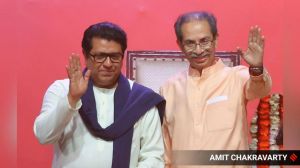Novel Sentences
A long-winded slice of Bombay
A long-winded slice of Bombay
Karan seth is a young photographer who works for a Bombay-based publication,The India Chronicle. His boss,Iqbal Syed,sends him to photograph a reclusive pianist,Samar Arora,who graduated from Juilliard,performed his first concert at the age of twelve,and went into retirement at the age of twenty-five. Karan,who is working on a personal project to document facets of Bombay,sets off on this task.
In the course of his work,he meets Samars lover Leo as well as his close friend Zaira,a movie star who is single-handedly responsible for raising Indias National Masturbation Index and who is being stalked by a politicians son. Meanwhile Karan,exploring Chor Bazaar in search of a Bombay Fornicator more commonly known as a planters chair meets Rhea Dalal,a rich housewife who once wanted to be a potter but now spends her time being,er,a rich housewife. The plot moves beyond the lotus-eating,Bellini-drinking Page Three lifestyle when,roughly a third of the way into the book,the stalker,besotted by obsession,rage and drink,suddenly pulls out a gun and shoots Zaira at a fashionable nightspot. While the stalkers father pulls all kinds of strings to protect his son,Samar grieves for Zaira.
Its hard to know where to begin with this novel. Its full of issues gay relationships,Section 377,AIDS,unequal marriages,people an actress,a genius pianist in early retirement,a genius potter who never was,a genius photographer in the making8230; and vignettes of Bombay flamingoes at Sewri,aarti at Babulnath temple. A few moments are nicely done,but as a whole the novel is completely over the top. Shanghvi has a gift for the odd,vividly startling description,and sometimes these work very nicelyat Haji Ali,flamingos with graceful necks like freshly serviced strings on a sitar; at Juhu Chowpatty,a bright orgy of billboards that hacked up the tender night; or,on the way to the Kanheri caves,a puzzle of shadows changed shape with the passing sun; or,seen from the window of a high-rise,a row of ugly cars looked like canker in a dogs ear. More bizarre,but funny nevertheless,is this description of the magazines purring fashion editor: Glee dripped out of Natasha like precum. And quite sweet,the description of a newborn baby who gazed up at the nurse in intense rumination,his liquid,almandine eyes gleaming with tender curiosity for all the terrible and fine things that lay beyond the parameters of his comprehension for now.
But such moments are too few,alas. The great weakness of this novel is that the characters all sound like each other,and like the rest of the narrative,resulting in a kind of flamboyant incoherence. Everyone speaks in sentences that are long,lush and often slightly ridiculous. A man who runs a hedge fund in Singapore doesnt merely think of his wife in Bombay: he thinks of her with ruinous ache. A couple living in two cities doesnt just value their sense of space: they journal the wisdom of separation. A photographer is not just talented,his talent is fierce and glorious,it is visual poetry8230; hard,ambiguous,luscious,possessed with incantatory power; indeed,it is incendiary8230; so huge and rambunctious it bled out of him like monsoon from an August sky. And what is one to make of a sentence such as this: Once the sun retreated from the horizon and into a strengthening night,the hurt of the world boldly invaded him through the wound in him,scaring away his loneliness.
- 01
- 02
- 03
- 04
- 05































